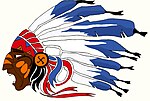103d Aero Squadron
| 103d Aero Squadron | |
|---|---|

103d Aero Squadron - SPAD Spad XIII C.1 of Capt. Robert Soubiran, 103d Aero Squadron, Serial # S7714.
|
|
| Active | 1917-19 |
| Country |
|
| Allegiance |
|
| Type | Squadron |
| Role | Pursuit |
| Size | 24 officers, 150 men, 24 aircraft |
| Part of | American Expeditionary Forces |
| Garrison/HQ | France |
| Engagements |
World War I |
| Decorations |
French Croix de Guerre with Two Palms French Fourragere |
| Commanders | |
| Notable commanders |
Maj. William Thaw II |
| Insignia | |
| Squadron insignia of the Lafayette Escadrille which was brought forward to the 103d Aero Squadron |  |
| Aircraft flown | |
| Fighter |
Spad VII, 1918 Spad XIII, 1918 |
| Service record | |
|---|---|
| Operations |
French Air Service 3d Pursuit Group Western Front, France: 18 February-11 November 1918 |
| Victories |
|
The 103d Aero Squadron was an aviation pursuit squadron of the U.S. Air Service that served in combat in France during World War I. Its original complement included pilots from the disbanded Lafayette Escadrille and Lafayette Flying Corps. One of those pilots, Paul F. Baer, became the first ace of an American unit in World War I.
The 103d Aero Squadron was the first U.S. pursuit squadron in action during World War I and had the longest combat service, from 19 February to 11 November 1918. It earned six battle participation credits, flew 470 combat missions, engaged in 327 combats, destroyed 45 German aircraft in aerial combat and claimed an additional 40 as probably destroyed, shot down two balloons, flew 3,075 hours over the front lines, and dropped 4,620 pounds of bombs. Its casualties were five killed in action, two killed in flying accidents, four prisoners of war, three wounded in action, and one injured in a forced landing.
The commander of the 1st Pursuit Wing, in general orders, said of the 103d:
"In February last the Lafayette Escadrille of the French Army was transferred to the 103d Aero Squadron, United States Army. It was the first, and for nearly two months it was the only American Air Service organization on the front. Since that time it is not too much to say that pilots who served in this squadron have formed the backbone of American Pursuit Aviation on the front...No task was too arduous or too hazardous for it to perform successfully. In the recent decisive operations of the First American Army the 103d Aero Squadron has done its share." — Lt. Col. Burt M. Atkinson, 16 November 1918
The history and lineage of the 103d Aero Squadron continues as part of the 94th Fighter Squadron of the United States Air Force.
The 103d Aero Squadron was organized on 31 August 1917 at Kelly Field, Texas, where its enlisted members, drawn from other units, trained until being moved to Garden City, New York for preparation for overseas movement. On 23 November 1917 the unit sailed on board the RMS Baltic from its port of embarkation at New York City. The Baltic joined a convoy at Halifax, Nova Scotia and arrived at Liverpool 7 December 1917. Because of a measles outbreak, it was quarantined at Winnall Down Camp outside Winchester until 23 December 1917, when it proceeded to France through Southampton and Le Havre. The squadron arrived at Issoudun on 28 December 1917, where it spent the month of January constructing hangars for the instructional school being built there. On 1 February it resumed training for combat at the front.
...
Wikipedia
